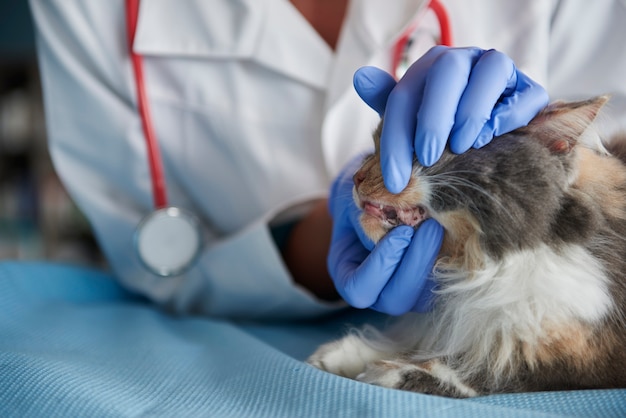Understanding Pet Dental Extractions: Process, Recovery, and Comfort

Understanding Pet Dental Extractions: Process, Recovery, and Comfort
Every pet owner wants to see their dog or cat happy and pain-free, but dental health issues can quietly cause discomfort, behavioral changes, and even more serious complications if left untreated. At St. Charles Veterinary Hospital, located at 39873 U.S. 27, Davenport, FL 33897, we understand how deeply you care about your furry companions. That’s why we’re committed to providing comprehensive dental care for pets in Davenport and surrounding communities, helping you ensure your pet’s smile remains healthy at every stage of life.
If you’re searching for information about pet dental extractions in Davenport or wondering what to expect when your veterinarian recommends this procedure, you’re not alone. Many pet owners have questions about when a dental extraction is necessary, how the process works, and how their pet’s comfort will be managed before, during, and after treatment. In this guide, we’ll walk you through the signs that your pet may need a dental extraction, explain the common causes, outline the extraction process, and offer tips for home care and recovery. We’ll also share how our veterinary team at St. Charles Veterinary Hospital supports you and your pet every step of the way, building a trusting relationship for all your veterinary needs. If you’re looking for a “vet near me” who prioritizes dental care for pets and long-term wellness, you’ve come to the right place.
Recognizing When Your Pet May Need a Dental Extraction
Dental problems in pets often progress quietly, and it can be challenging for owners to recognize when their dog or cat is suffering from an issue that requires extraction. Key symptoms to watch for are persistent bad breath, visible tartar buildup, red or bleeding gums, difficulty chewing, dropping food, pawing at the mouth, and noticeable swelling around the jawline. Additionally, pets may show reluctance to eat hard food, develop loose or missing teeth, or even experience draining wounds on the face if an abscessed tooth is present.
Behavioral changes can also signal oral discomfort. For instance, a normally playful dog might become withdrawn or seem irritable, while a cat may hide more often or resist being touched around the face. If you notice any of these warning signs, especially in older pets or those with a known history of dental disease, it is important to contact your veterinarian promptly. Early intervention with dental care for pets in Davenport can prevent further complications and help preserve your pet’s overall health.
Why Do Pets Need Dental Extractions?
Understanding the causes behind dental extractions helps pet owners make informed choices about their animal’s care. The most common reason for tooth removal is advanced periodontal disease, which develops when plaque and tartar accumulate below the gum line, leading to infection, gum recession, and loss of the supporting bone. Additional causes include fractured teeth from chewing on hard toys, retained baby teeth that never fall out, severe tooth decay, or resorptive lesions—especially common in cats—where the body begins to break down the tooth structure itself.
Sometimes, pets suffer from oral trauma, such as being struck by an object or involved in an accident, which can result in broken or displaced teeth that are no longer viable. In rare cases, tumors or cysts may require extraction as part of a broader treatment plan. Each case is unique, and your veterinarian will conduct a thorough oral exam, often with dental X-rays, to determine the underlying reason and develop a safe, effective plan for pet dental extractions in Davenport.
What Happens During a Pet Dental Extraction?
When your dog or cat is scheduled for a dental extraction at St. Charles Veterinary Hospital, we want you to feel confident in the care they receive. The process begins with a pre-anesthetic evaluation to ensure your pet is healthy enough for the procedure; this may include bloodwork and a review of your pet’s medical history. On the day of the extraction, your pet will be placed under general anesthesia so that they remain comfortable and pain-free throughout the procedure.
Our veterinary professionals will perform a comprehensive oral examination and use dental radiographs to assess both visible and below-the-gum-line dental disease. Treatment approaches involve carefully removing the affected tooth or teeth, minimizing trauma to surrounding tissues, and cleaning the area to reduce the risk of infection. In some cases, dissolvable sutures may be placed to help the gums heal properly.
Pain management is a top priority for our team. We utilize a combination of local anesthetics, anti-inflammatory medications, and tailored pain control protocols to ensure your pet’s comfort during and after the extraction. After the procedure, your pet will be closely monitored as they wake up from anesthesia. Most pets recover quickly, although it is normal for them to be a bit sleepy or less active for the remainder of the day.
Recovery and Home Care After a Pet Dental Extraction
Helping your pet recover comfortably at home is an important part of the extraction process. After a dental extraction, your veterinarian will provide clear instructions tailored to your pet’s specific needs. Steps typically include feeding a soft food diet for several days to prevent irritation of the healing gums, administering any prescribed pain medications or antibiotics, and gently monitoring your pet for signs of discomfort or complications.
You might notice mild bleeding, slight swelling, or temporary changes in eating habits during the first few days. Most pets adapt quickly and display improved appetite and energy as oral pain subsides. It is important to prevent your pet from chewing on hard toys, bones, or objects until your veterinarian confirms that healing is complete. Keeping your pet’s mouth clean is also essential; your veterinarian may recommend gentle rinsing or the use of approved oral care products designed for pets.
If you have concerns during recovery—such as excessive swelling, ongoing bleeding, refusal to eat, or signs of pain that are not controlled by medication—reach out to your veterinary team for support. Our goal is to ensure your pet’s recovery is smooth and their return to normal activities is as quick as possible. By following professional advice and remaining attentive to your pet’s needs, you can help them heal with minimal stress.
Preventing Dental Disease and Future Extractions
While some dental problems are unavoidable, many can be prevented with proactive dental care for pets in Davenport. Regular wellness examinations at St. Charles Veterinary Hospital allow our veterinarians to detect early signs of dental disease and recommend appropriate interventions before tooth extraction becomes necessary. Steps you can take at home include brushing your pet’s teeth with veterinary-approved toothpaste, providing dental chews recommended by your veterinarian, and offering a balanced diet that supports oral health.
Annual or semiannual professional dental cleanings are another key strategy for preventing advanced dental disease. During these cleanings, your pet’s teeth are scaled and polished under anesthesia, removing plaque and tartar that cannot be addressed through home care alone. Additionally, your veterinarian may suggest dental X-rays to monitor the health of teeth and roots that cannot be seen during a visual exam.
Maintaining a consistent oral hygiene routine and scheduling regular visits for dental care for pets in Davenport will help reduce the risk of painful extractions in the future. If you ever have questions about your pet’s dental health, our team is here to provide guidance, answer your concerns, and tailor a plan that fits your pet’s individual needs.
When to Seek Veterinary Care for Dental Issues
Determining when to seek professional help is crucial for your pet’s well-being. If you observe persistent bad breath, visible swelling, bleeding gums, difficulty eating, or any behavioral changes that suggest oral discomfort, it is important to schedule an appointment with your veterinarian promptly. These symptoms can indicate underlying dental disease that requires assessment and potentially pet dental extraction in Davenport.
Prompt veterinary attention is especially important if your pet is not eating, is lethargic, or if you see facial swelling or draining wounds, as these can be signs of severe infection or abscess. Delaying care can lead to increased pain, tooth loss, and the spread of infection to other parts of the body. At St. Charles Veterinary Hospital, our veterinarians are prepared to address dental concerns, provide thorough diagnostics, and recommend the most appropriate course of action for your pet.
If you are searching for a “dental vet near me” or “quality vet near me” because you are worried about your pet’s oral health, our hospital is committed to helping you find answers and relief.
Compassionate Dental Care for Pets in Davenport: Schedule Your Pet’s Visit Today
Your pet’s comfort, health, and happiness are our top priorities at St. Charles Veterinary Hospital. Whether your dog or cat needs a dental examination, professional cleaning, or pet dental extraction in Davenport, our veterinary team is here to support you with expertise and empathy throughout the entire process. We believe in building lasting partnerships with pet owners and offering guidance for every stage of your companion’s life.
If you are concerned about your pet’s dental health or have noticed changes in their eating habits or behavior, we encourage you to schedule an appointment with our veterinarians. Our commitment to thorough dental care for pets in Davenport and surrounding communities means you can trust us to provide the highest quality service in a caring environment. For those searching for a “vet near me” who understands the importance of lifelong oral health, St. Charles Veterinary Hospital is here for you.
Contact us today at (863) 438-6600 or visit us at 39873 U.S. 27, Davenport, FL 33897 to schedule your pet’s dental evaluation. By taking proactive steps now, you help ensure your furry friend enjoys a future filled with comfort, vitality, and plenty of tail wags or purrs.
This article is intended for informational purposes only and does not replace professional veterinary advice. If you have concerns about your pet’s health, always consult your veterinarian for personalized recommendations and care. For further reading on pet dental health, reputable sources such as the American Veterinary Dental College (https://www.avdc.org/) and the American Veterinary Medical Association (https://www.avma.org/resources/pet-owners/petcare/pet-dental-care) offer additional insights.


















